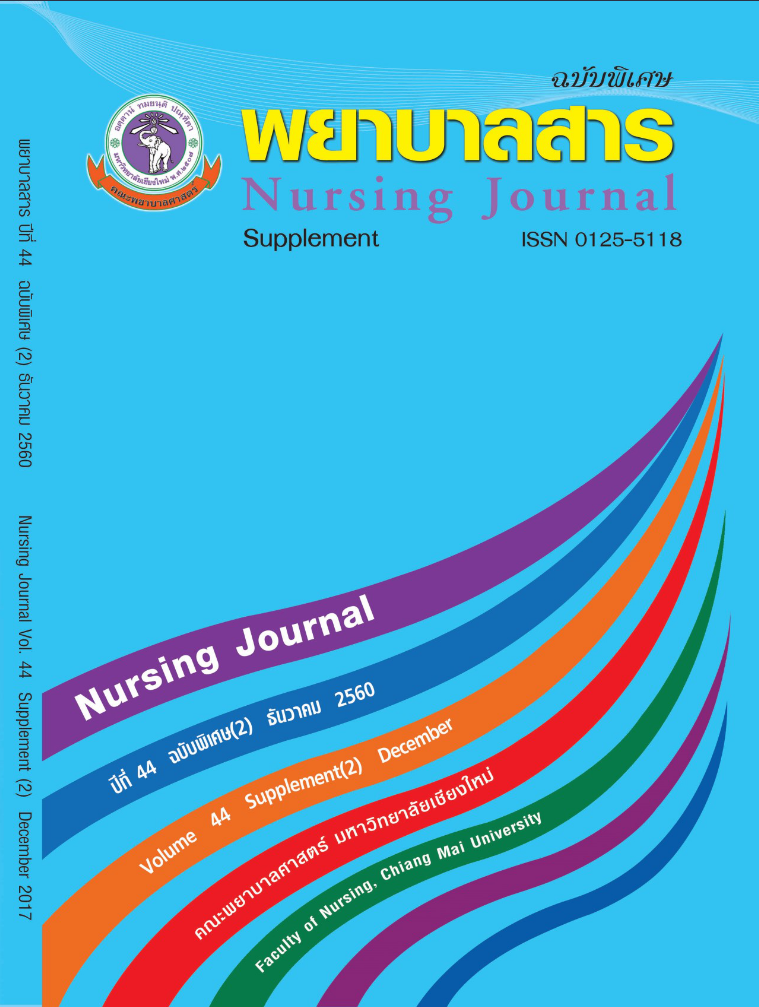Parental Knowledge and Perceived Self-Efficacy in Teaching Sex Education to Young Children
Keywords:
Parental knowledge, Perceived Self Efficacy, Sex Education for Young ChildrenAbstract
Thai children are facing problems with sex education. The problems will be resolved, if they have an appropriate understanding sex in early childhood. Although, children can learn about sex through a variety of media, they also need guidance and sex education. The role of parents is important in teaching children about sex. This descriptive research aimed to study the correlation of parental knowledge, perceived self-efficacy in teaching sex education to young children. The sample consisted of 303 parents of young children in Chiang Rai, selected by Stratified and purposive sampling. The instruments of this study were knowledge of sex education in early childhood questionnaires, perceived self-efficacy questionnaires, and practice of sex education for young children by parent questionnaires. The data were analyzed using descriptive statistics and Spearman's rank correlation coefficient. The results show that parents had a moderate level of knowledge, a high level of perceived self-efficacy, and a moderate level of sex education. Perceived self-efficacy correlated with sex education (r = .34, p < .01; r = .73, p < .01). The results indicated that parents should be knowledgeable, have perceived self-efficacy, and promote sex education for young children to have knowledge and appropriate understanding of sex.
References
กรุงเทพ: ห้างหุ้นส่วนจำกัด บางกอกบล็อก.
ชลนิทรา แสงบุราณ (2551). รูปแบบการเลี้ยงดูและการสื่อสารเรื่องเพศระหว่างมารดาและบุตรสาวต่อพฤติกรรมทางเพศของวัยรุ่นตอนต้นหญิง เขตกรุงเทพมหานคร (วิทยานิพนธ์ปริญญาวิทยาศาสตรมหาบัณฑิต). บัณฑิตวิทยาลัย, มหาวิทยาลัยมหิดล.
ประกาย จิโรจน์กุล. (2556). การวิจัยทางการพยาบาล: แนวคิด หลักการ และวิธีปฏิบัติ. นนทบุรี :
โครงการสวัสดิการวิชาการ สถาบันพระบรมชนก.
มลิจันทร์ เกียรติสังวร. (2543). ปัจจัยที่มีผลต่อการให้ความรู้เรื่องเพศศึกษาของมารดาแก่บุตรสาววัยรุ่น อำเภอ
เสนา จังหวัดพระนครศรีอยุธยา (วิทยานิพนธ์ วิทยาศาสตรมหาบัณฑิต (สาธารณสุขศาสตร์)
สาขาอนามัยครอบครัว). บัณฑิตวิทยาลัย, มหาวิทยาลัยมหิดล.
ศุภาศิริ การิกาญจน์. (2541). บทบาทพ่อแม่ในการสอนเพศศึกษาแก่ลูกสาววัยรุ่นในเขตกรุงเทพมหานคร
(วิทยานิพนธ์ปริญญาสังคมศาสตรมหาบัณฑิต). บัณฑิตวิทยาลัย, มหาวิทยาลัยมหิดล.
เสถียร เชื้อลี และนงเยาว์ ณรงค์แสง. (2550). ความรู้ ทัศนคติ และรูปแบบการสอนเรื่องเพศศึกษาในครอบครัว
กรณีศึกษาจังหวัดอุบลราชธานี. รายงานวิจัยฉบับสมบูรณ์. สำนักงานป้องกันควบคุมโรคที่ 7.อุบลราชธานี: กรมควบคุมโรค กระทรวงสาธารณสุข.
สำนักนโยบายและยุทธศาสตร์ กระทรวงสาธารณสุข. (2560). สถิติการคลอดของแม่วัยรุ่นประเทศไทย ปี พ.ศ.
2558: Statistics on Adolescent Births, Thailand 2015. นนทบุรี: โรงพิมพ์ชุมนุมสหกรณ์การเกษตรแห่งประเทศไทย.
สำนักงานการอนามัยเจริญพันธุ์ กรมอนามัย. (2557). สถิติการคลอดของแม่วัยรุ่นประเทศไทย ปี พ.ศ. 2556:
Statistics on Adolescent Births, Thailand 2013. นนทบุรี: สำนักงานกิจการโรงพิมพ์องค์การสงเคราะห์ทหารผ่านศึก ในพระบรมราชูปถัมภ์.
สำนักอนามัยการเจริญพันธุ์ กรมอนามัย. (2558). คู่มือการเรียนการสอนเรื่องเพศศึกษาและทักษะชีวิตใน
นักเรียนแบบบูรณาการ. กรุงเทพฯ: ศูนย์สื่อและสิ่งพิมพ์แก้วเจ้าจอม.
สำนักงานสถิติแห่งชาติ. (2552). สรุปสำหรับผู้บริหารการสำรวจอนามัยและสวัสดิการ พ.ศ. 2552.
กรุงเทพมหานคร. สำนักสถิติพยากรณ์ สำนักงานสถิติแห่งชาติ.
อรพรรณ ทิมรอด. (2546). ปัจจัยที่มีความสัมพันธ์กับบทบาทของบิดาในการให้ความรู้เรื่องเพศศึกษา
แก่บุตรชายวัยรุ่น (วิทยานิพนธ์วิทยาศาสตร์มหาบัณฑิต (อนามัยครอบครัว). บัณฑิตวิทยาลัย,
มหาวิทยาลัยมหิดล.
อรไท พิพิธพัฒน์ไพสิฐ และ จินตนา ไชยวิโน. (2551). การสื่อสารเรื่องเพศศึกษาในเยาวชน ตำบลเชียงกลาง
จังหวัดน่าน. นนทบุรี: สถาบันวิจัยระบบสาธารณสุข.
Bandura, Albert. (1997). Self – efficacy: The exercise of control. New York: W.H. Freeman.
Balter, A.S., Rhijn, T. V., & Davies, W. J. (2016). The development of sexuality in childhood in early
learning settings: An exploration of Ontario Early Childhood Educators’ perceptions. The Canadian Journal of Human Sexuality, 25(1), 30-40. Retrieved from https://doi.org/10.3138/cjhs.251-A3
Chantrapanichkul, P. & Chawanpaiboon, S. (2013). Adverse pregnancy outcomes in cases
involving extremely young maternal age. International Journal of Gynecology &
Obstetrics, 120(2), 160-164. Retrieved from https://doi.org/10.1016/j.ijgo.2012.08.024
Duvall, E. M., & Miller, B. C. (1985). Marriage and family development (6th ed.). New York:
Harper & Row.
United Nations Population Fund. (2012). Impact of demographic change in Thailand.
Retrieved from https://esa.un.org/unpd/wpp
Downloads
Published
How to Cite
Issue
Section
License
บทความที่ได้รับการตีพิมพ์เป็นลิขสิทธิ์ของวารสารพยาบาลสาร
ข้อความที่ปรากฏในบทความแต่ละเรื่องในวารสารวิชาการเล่มนี้เป็นความคิดเห็นส่วนตัวของผู้เขียนแต่ละท่านไม่เกี่ยวข้องกับมหาวิทยาลัยเชียงใหม่ และคณาจารย์ท่านอื่นๆในมหาวิทยาลัยฯ แต่อย่างใด ความรับผิดชอบองค์ประกอบทั้งหมดของบทความแต่ละเรื่องเป็นของผู้เขียนแต่ละท่าน หากมีความผิดพลาดใด ๆ ผู้เขียนแต่ละท่านจะรับผิดชอบบทความของตนเองแต่ผู้เดียว






